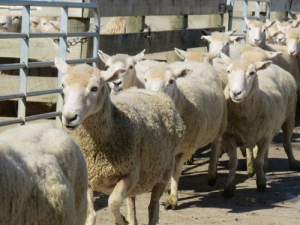Job losses worry meat sector
New Zealand's meat processing industry says, while it supports moves away from coal, it has some major concerns about cuts to livestock numbers as proposed in the recent Climate Change Commission’s draft report.
 You cannot build a “Fonterra” from the meat industry because there are too many players, says Hamilton.
You cannot build a “Fonterra” from the meat industry because there are too many players, says Hamilton.
Consolidating all the processors and the resultant gain of $10/lamb gain at the farmgate, as estimated by Meat Industry Excellence, is still not a “game changer” for sheep farmers, says Silver Fern Farms chief executive Dean Hamilton.
And you cannot build a “Fonterra” from the meat industry because there are too many players, Hamilton told Rural News, commenting on issues raised by disgruntled shareholders.
Hamilton says Silver Fern Farms’ view is you need a strategy that can control and deliver.
“We have a clear strategy that we articulate publicly and that’s what we’re pushing on with.
“If there is the opportunity to do something in terms of taking out processing and overhead costs, we will consider that. But that in itself is not a strategy; just reducing costs is not a strategy; it is an enabler, but not a strategy.”
The meat industry will never build a Fonterra from the ground up, he says. Fonterra had 100% of the supply and only two co-ops in the end. The meat industry has an enormous array of participants.
Hamilton says Meat Industry Excellence’s own analysis shows that if all processors combined, the gain would be $10/lamb, but realistically not all processors would ever combine, so any gain would be less.
“Even if you stuck to the $10 if everyone combined, does that change the world for a sheep farmer? It improves it but it doesn’t turn his business from a challenging business to a higher returning business. And that’s why we don’t believe that combination by itself is a strategy.
“We have a clear plate-to-pasture strategy of investing in the value chain, creating retail products – seen in supermarkets here and overseas – and investing in branded product into restaurants,” he says. “So the primary strategy we’re introducing is trying to extract a higher price for the product and share that with our farmer supplier base, so we capture more value in the process and farmer part of that supply chain.
“We have been on that journey for five years now, creating the Silver Fern Farm branded product range, and we believe there are higher earnings from that long term.
“Does that require the industry to rationalise its capacity? No. Are there benefits from rationalising its capacity? Yes.”
Silver Fern Farms will consult with shareholders in August on options for raising capital.
“We’ve got people who are interested; it is taking time to work through. If the company believes one of those transactions is in the interests of shareholders they will be recommending it. If they think none of those are attractive they won’t be doing it.”
In the modern world it is a “dangerous position” to see foreign capital as a bad thing, Hamilton says. “We are not purposely pursuing foreign capital, but if taking in that capital is the right thing to do and in the best interests of everybody I’m sure the board will be recommending it.
Hamilton says accusations that SFF had ignored the MIE report were not true, but he adds it did not introduce anything new that an experienced industry participant hadn’t thought of.
Meanwhile, Alliance chairman Murray Taggart says the company has new proposals – not necessarily mergers – which it will take to the shareholders in spring.
To reveal those plans now to anyone would be “commercially stupid”. However, he has informed shareholders calling for a special meeting that those proposals would be forthcoming and says it is up to them whether they still want to pursue the special meeting.
Taggart says the company talks with different industry players and looks for opportunities to restructure to operate better. “For mergers to work we need two companies that are both profitable, have strong balance sheets and a stable-to-increasing livestock supply,” he says. People can reach their own conclusions as to what companies they could work with on that basis.
“As a company we are open to opportunities, but those are some of the boxes that the commercial opportunity has to tick.”
Taggart says the status quo is not an option, but a merger of Alliance with any other player in the industry is not necessarily a solution.
Taggart says he gets the sense people think Silver Fern and Alliance don’t get on or “throw rocks at each other”.
“I think people try to portray it that we don’t see eye to eye as companies but that is just not the case. The same applies whether you’re talking about Anzco or Affco or any other companies in the industry.”
An industry-wide project led by Ministry for Primary Industries (MPI) is underway to deal with the rising number of feral pests, in particular, browsing pests such as deer and pigs.
A Hawke's Bay apple grower says it's no longer profitable for him to export apples to the US because of the 15% tariff imposed on them by Donald Trump.
As the clock ticks towards the 3G mobile network shutdown, farmers are being warned to upgrade or risk losing connection to their supply chain.
Alliance and Dawn Meats have completed their new strategic partnership.
Three New Zealand agritech companies are set to join forces to help unlock the full potential of technology.
As the sector heads into the traditional peak period for injuries and fatalities, farmers are being urged to "take a moment".